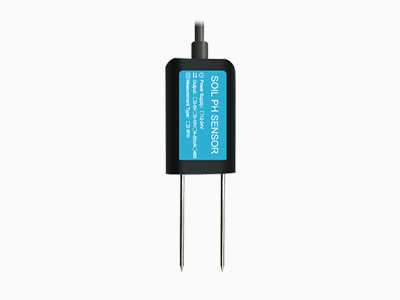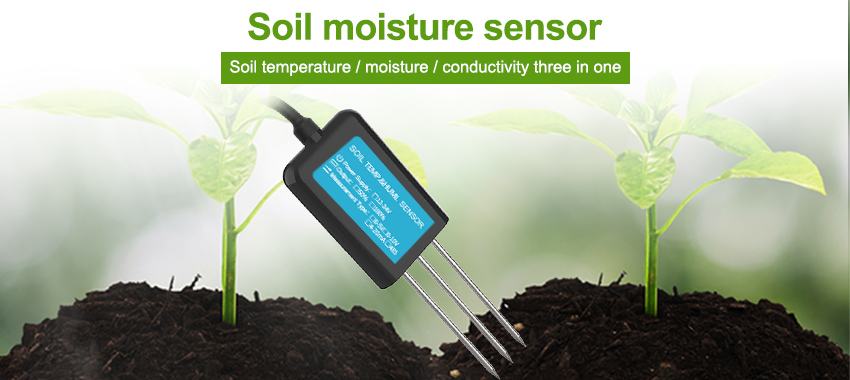Agriculture is undergoing a transformative revolution with the advent of smart farming technologies. Among these innovations, soil sensors are playing a pivotal role in optimizing crop production, conserving resources, and promoting sustainable practices. In this article, we will delve into the significance of soil sensors in modern agriculture, explore their applications, and discuss how they are revolutionizing farming practices to meet the challenges of food security and environmental sustainability.

I. The Importance of Soil Sensors in Modern Agriculture Soil quality directly affects plant growth,
nutrient uptake, and overall crop productivity. Soil sensors enable farmers to monitor key parameters such as moisture content, temperature, nutrient levels, and pH, providing valuable real-time data for informed decision-making. By understanding the unique characteristics of their soils, farmers can optimize irrigation, fertilization, and other agricultural practices, leading to increased yields and reduced resource wastage.
II. Applications of Soil Sensors in Smart Farming Soil sensors find numerous applications in smart farming, including:
- Irrigation Management: Soil moisture sensors measure the water content in the soil, helping farmers determine when and how much to irrigate. This enables precise irrigation scheduling, reducing water waste and ensuring optimal moisture levels for plant growth.
- Nutrient Monitoring: Soil sensors analyze nutrient concentrations in the soil, allowing farmers to tailor fertilization programs to specific crop requirements. By avoiding over- or under-fertilization, nutrient sensors promote efficient nutrient use, minimize environmental pollution, and maximize crop health.
- pH and Soil Composition Analysis: Soil sensors assess the pH levels and composition of soils, which are crucial factors influencing nutrient availability. Accurate pH monitoring helps farmers adjust soil acidity or alkalinity to create optimal growing conditions for plants.
- Disease and Pest Management: Soil sensors can detect the presence of pests, pathogens, and nematodes, enabling early intervention and targeted pest management strategies. By identifying potential threats, farmers can take proactive measures to protect their crops and reduce the use of pesticides.
III. Benefits of Soil Sensors in Agriculture The integration of soil sensors into farming practices offers several key benefits:
- Precision Farming: Soil sensors enable precise and site-specific management of agricultural inputs, optimizing resource allocation and reducing waste. This precision approach helps farmers achieve higher yields while minimizing environmental impact.
- Water Conservation: With accurate soil moisture monitoring, farmers can avoid under- or over-watering, ensuring efficient water use and reducing irrigation costs. This promotes sustainable water management practices, particularly in regions prone to drought or water scarcity.
- Increased Yield and Quality: By tailoring irrigation, fertilization, and other cultivation practices based on real-time soil data, farmers can optimize plant growth conditions, leading to improved crop yields and enhanced product quality.
- Environmental Sustainability: Smart farming technologies like soil sensors promote sustainable agriculture by minimizing the use of fertilizers, pesticides, and water resources. This reduces environmental pollution, conserves natural resources, and protects ecosystems.

IV. Future Developments in Soil Sensor Technology Soil sensor technology is continuously evolving,
with ongoing research and development to enhance functionality and usability. Future advancements may include wireless sensor networks, integration with satellite and drone imaging technologies, and the incorporation of artificial intelligence algorithms for automated decision-making. These developments will further empower farmers with precise and timely information, revolutionizing agricultural practices.
V. Conclusion Soil sensors are revolutionizing agriculture by enabling farmers to make data-driven decisions for efficient resource management and sustainable practices.
Through real-time monitoring of soil parameters, such as moisture, nutrients, pH, and composition, farmers can optimize irrigation, fertilization, and pest management strategies, leading to increased yields, reduced environmental impact, and enhanced food security. As soil sensor technology continues to advance, its integration into smart farming systems will become increasingly essential for the future of sustainable agriculture.
